Light Vans for the Small Trader.
Page 15

If you've noticed an error in this article please click here to report it so we can fix it.
"The Work Our Ford Van Does Would Kill a Horse Stone Dead."
During the war period many traders, as a result of their having to find other means than delivery by horse, have become converted to the use of the light van. That most of these tradesmen will become permanent users we have not the slightest doubt, bearing in mind the success with which their inaehines are being operated. For instance, Messrs. Gibbard and Co., of Stroud Green, wholesale and retail greengrocers and fruiterers have bought both a Ford van and a Wichita 50-cwt. lorry since the outbreak of hostilities. They have had the Ford in use for over a year, and the heavier machine for six months.
A member of the firm, questioned as to whether war conditions had necessitated the use of commercial vehicles, said: "Yes, partially, but not wholly by any means. The continual growth of our trade was the real factor which called for improved delivery means.
"The work of our machines ? The light van, with which I believe you are mainly concerned just now, is chiefly used for house-to-house deliveries of vegetables and fruit as well as jam, in suburbs north of London. On this class of work the van starts off with an average load of 7 cwt. on each journey, and covers approximately 200 miles a week. Such work, to put it colloquially, would kill a horse stone dead, Exigencies of the occasion demand that this load be slightly exceeded sometimes' but we consider that, in order to get efficient service from a light van, like the Ford, it is wise to keep the load within reasonable limits. Personally I don't think the load should over exceed 8 cwt."
" Do you use horses at all now ? "
"Very little ; we have dispensed with a number, and those we have only make local house-to-house calls. For this simple work they prove satisfactory."
" Do you use petrol for the machines, and what mileage per gallon do you obtain?"
"Petrol, yes, and we're allowed 150 gallons per month. We obtain 20 m.p.g. on the Ford and 11 on the Wichita. The Ford has covered over 10,000 miles, and runs as well as ever."
"Tires? Well, at present we've Duncops fitted and they are proving most satisfactory. We've tried several other makes as well, but in my opinion Dunlops want a lot of beating. I would recommend them for light-van work without hesitation."
e presume that you attach an advertising value to the Ford, seeing that you have a delicately-painted body which is neatly lettered fitted to the chassis."
"Of course we do. Bearing in mind the miles the van covers it is certainly bound to attract the attention of a likely customer. It advertises our jams, the sale for which has considerably increased, due in a great measure to this feature."
"So you're very well satisfied with the Ford for your class of work?" "Most satisfied. We attach many advantages to the use of the Ford which cannot be equalled by other forms of delivery. We are sure that the van was directly responsible for a considerably increased turnover on last year's working, and this information, together with the fact that we have another on order, of the same make, should prove the undoubted utility of a light van for the small trader."
A Ford in the Service of a Milkman.
The adaptability of the light van for all forms of service is no more an outstanding fact than the success with which it is operated on this varying work. We have published the views of a baker and butcher, and now a fruiterer, whilst the illustration below shows a Ford light van in use by a milkman. The Petherton Dairy, the owners of this van, have been operating it with success for eight months.
.." I use the van for collecting milk and other dairy produce from farms which are about 10 miles out of London. It starts out early in the morning to do this and returns in time to distribute milk on the second round," was the reply to our opening question.
" What about the first round of the day 7 " "That is done with a bicycle and hand barrows." "Did you dispense with horses when buying the Ford?" we queried. "Yes, all of them. The work the Ford does was formerly carried out by three horses, and the satisfaction I obtained by their use was much less than with the Ford. Speedy collection and delivery were out of the question with horses." Petrol is used for the machine and an average m.p.g. of 22 is obtained. The mileage covered per week is approximately 200.
"I'm perfectly satisfied with the service I get from the Ford. The machine is easy to understand mechanically and simple to manipulate. The chief advantages which I derive from the use of the van are that I get much more work done in less time, and I have been able to dispense with several men. "I find the cost of operating the machine about the same as horses, and I can tell you that the purchase price of a horse in normal times has got to drop very considerably before / think about replacing the Ford. No, I don't think I shall fuss with horses again."






















